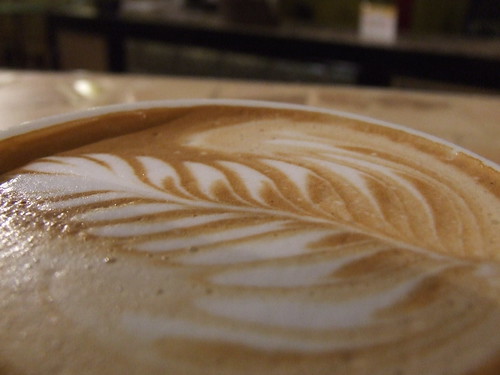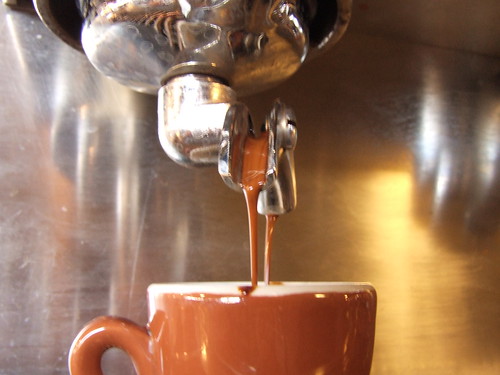After Jason's Latte Art class at the recent barista jam held in San Antonio, TX, we decided to take some time to get Jason's perspective on coffee.

Decorated Cappuccino - Photo by Jason Haeger
Barismo: What is it like to get in front of your peers and teach?
Jason: It really depends. When I know enough about the audience to customize an outline for that group or person specifically, I can stick to a plan and just work through it. It's not impossible to ignore butterflies in those situations. It's the situations where I have to improvise from the start that are really nerve racking. The biggest fear is of being unprepared, and that people will walk away with nothing. It's reassuring when you know you were actually able to give something. Then again, you can't please all of the people all of the time, but that's still a foreign concept in practice.
Barismo: You live in Lubbock, which is not exactly the hub of the coffee universe. How do you keep inspired to learn more and keep interested?
Jason: Honestly, I can't ever remember a time when I WASN'T inspired to learn more. I've been fascinated with coffee since I was a little kid, but never devoted much effort to it until not too long ago. It's very easy to stay motivated to push for quality and spread the "gospel" of good coffee when you're in a place that doesn't seem to appreciate quality in much of anything in the way of food or drink. That's not to say there aren't pockets of us here, but for the most part, we're definitely in the minority.

Pulling Brown Espresso - Photo by Jason Haeger
Barismo: Does being largely self taught through print and online sources help you have a different perspective on the industry?
Jason: I wouldn't even know. This is the only perspective I have ever had. I have never really received any formal training. I have never been served a great espresso. I have poured art on more lattes and cappuccinos than I care to count, but I have never myself been served a drink adorned with a rosetta. I guess I could say that it has helped me avoid the place where I become satisfied with "good enough". I have never experienced a situation where I physically saw a benchmark to reach. I have never said to myself, "once I can reach ________'s level, I'll be satisfied". I have no reference to where I am now from where I was when I began. If that's a different perspective, then I guess you have your answer. Another aspect is that everything I know has been a direct result of reading, and then going and practicing through trial and error. I've never had a coach to tell me to tweak part of my technique a certain way to achieve better results. It's always just been me, typed posts and articles, and my taste buds to guide my progress. I think it's taken me a lot longer than it could have if I had been trained by a proper coach.
Barismo: What is the role of a barista in using the variables they control?
Jason: Is not the role to deliver the absolute best product they can within the limitations of the situation? Aside from the obvious, the role is also to help the customers along in their discovery and journey through the world of coffee. Of course, not every customer wants to delve into it that far, but for those who do, the barista should help guide them, and match their tastes with coffees. Not all variables are grind size, time, volume, and so on. Other variables are social in nature. I think it's important to be able to match a customer who has never stepped foot into the door before to their future "the regular" in less than a minute. Much of that process is a banter that much resembles 20 Questions, but if you nail it, you've almost landed the customer for life. Developing the relationship between the business, and not necessarily the barista him/herself, and the customer is vitally important.

Photo: Jason Haeger
Barismo: What role does flavor play in your philosophy of coffee?
Jason: Flavor is in the top 2 reasons for drinking coffee in the first place, for me. The second being that coffee serves as a bit of a comfort item. The third and more physical reason being the stimulating effect. The only thing that could keep such an ancient tradition interesting is variety. The only real variety is to be found in the flavors that develop from the agricultural part of the spectrum. To love anything is to take it at face value, and embrace it. How could I call myself a coffee lover if I did not strive to find the true flavor identity of a coffee? At this level, however, the quality of the seed becomes quite evident, and the flavor reflects this quality in an either positive or negative light. This leads to a push for inherent quality in the coffee seed from its very beginning: on the tree. Every living thing will have a long-term response to the situations it has been through. The better the upbringing, the better the fruits of the labor. This is common sense, and it seems our industry is just beginning to really understand that. And what is the purpose of all of this care? The consumption and enjoyment of the second most traded product in the world. We still have no idea how far this notion of quality can go, and the flavors we're experiencing as a result of this movement have been astounding. It's the result of a job well done, and I'm all about it.
